Analysts play a key role in interpreting data and providing actionable insights that drive business decisions. They act as the bridge between raw data and strategic planning, ensuring that organizations can make informed choices based on accurate and timely information.
Analyst skills include proficiency in data analysis tools such as Excel, SQL, and Python, as well as abilities like critical thinking and effective communication.
Candidates can write these abilities in their resumes, but you can’t verify them without on-the-job Analyst skill tests.
In this post, we will explore 9 essential Analyst skills, 11 secondary skills and how to assess them so you can make informed hiring decisions.
Table of contents
9 fundamental Analyst skills and traits
The best skills for Analysts include Data Analysis, Statistical Knowledge, SQL Proficiency, Excel Mastery, Critical Thinking, Programming Skills, Data Visualization, Business Acumen and Attention to Detail.
Let’s dive into the details by examining the 9 essential skills of a Analyst.
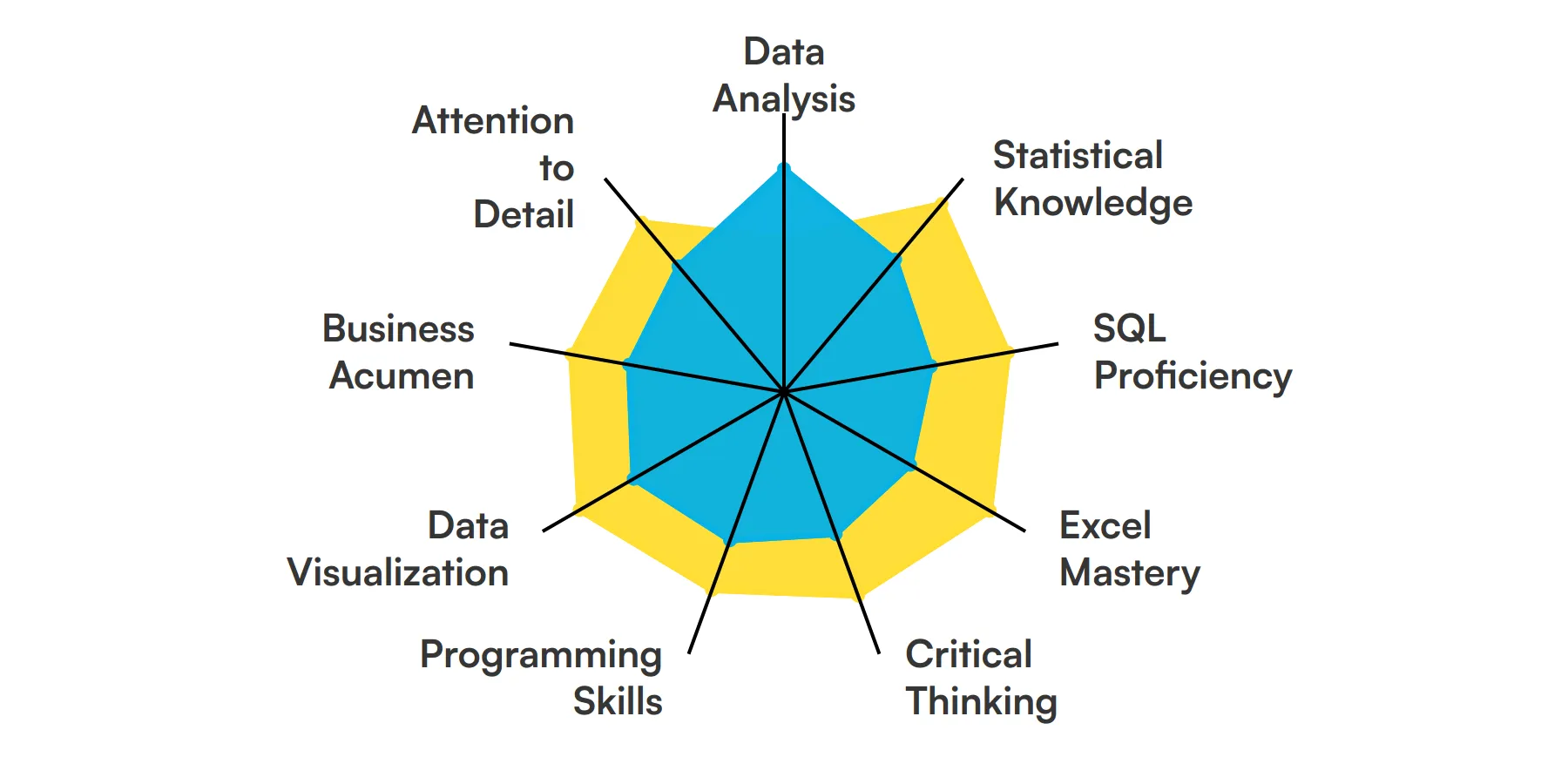
Data Analysis
Data analysis is the backbone of an analyst's role. It involves examining datasets to extract meaningful insights, identify trends, and support decision-making processes. Analysts use various tools and techniques to interpret data and provide actionable recommendations.
For more insights, check out our guide to writing a Data Analyst Job Description.
Statistical Knowledge
Understanding statistics is crucial for an analyst. This skill helps in designing experiments, testing hypotheses, and validating results. Analysts apply statistical methods to ensure the accuracy and reliability of their findings.
SQL Proficiency
SQL proficiency is essential for querying databases and retrieving relevant data. Analysts use SQL to manipulate and analyze data stored in relational databases, enabling them to generate reports and insights efficiently.
Check out our guide for a comprehensive list of interview questions.
Excel Mastery
Excel is a powerful tool for data manipulation and visualization. Analysts use Excel to organize data, perform complex calculations, and create charts and graphs that communicate their findings effectively.
Critical Thinking
Critical thinking allows analysts to evaluate information objectively and make reasoned judgments. This skill is vital for identifying patterns, solving problems, and making data-driven decisions.
Programming Skills
Programming skills, particularly in languages like Python or R, are important for automating data analysis tasks and performing advanced analytics. Analysts use programming to handle large datasets and implement machine learning models.
Data Visualization
Data visualization involves presenting data in a graphical format. Analysts use visualization tools like Tableau or Power BI to create interactive dashboards that help stakeholders understand complex data easily.
Business Acumen
Understanding the business context is crucial for an analyst. This skill helps in aligning data analysis with business goals, ensuring that insights are relevant and actionable for decision-makers.
For more insights, check out our guide to writing a Business Analyst Job Description.
Attention to Detail
Attention to detail ensures accuracy in data analysis. Analysts must meticulously check their work to avoid errors and ensure that their insights are based on reliable data.
11 secondary Analyst skills and traits
The best skills for Analysts include Time Management, Communication Skills, Problem-Solving, Project Management, Database Management, Machine Learning, ETL Processes, Domain Knowledge, Data Warehousing, API Integration and Cloud Computing.
Let’s dive into the details by examining the 11 secondary skills of a Analyst.
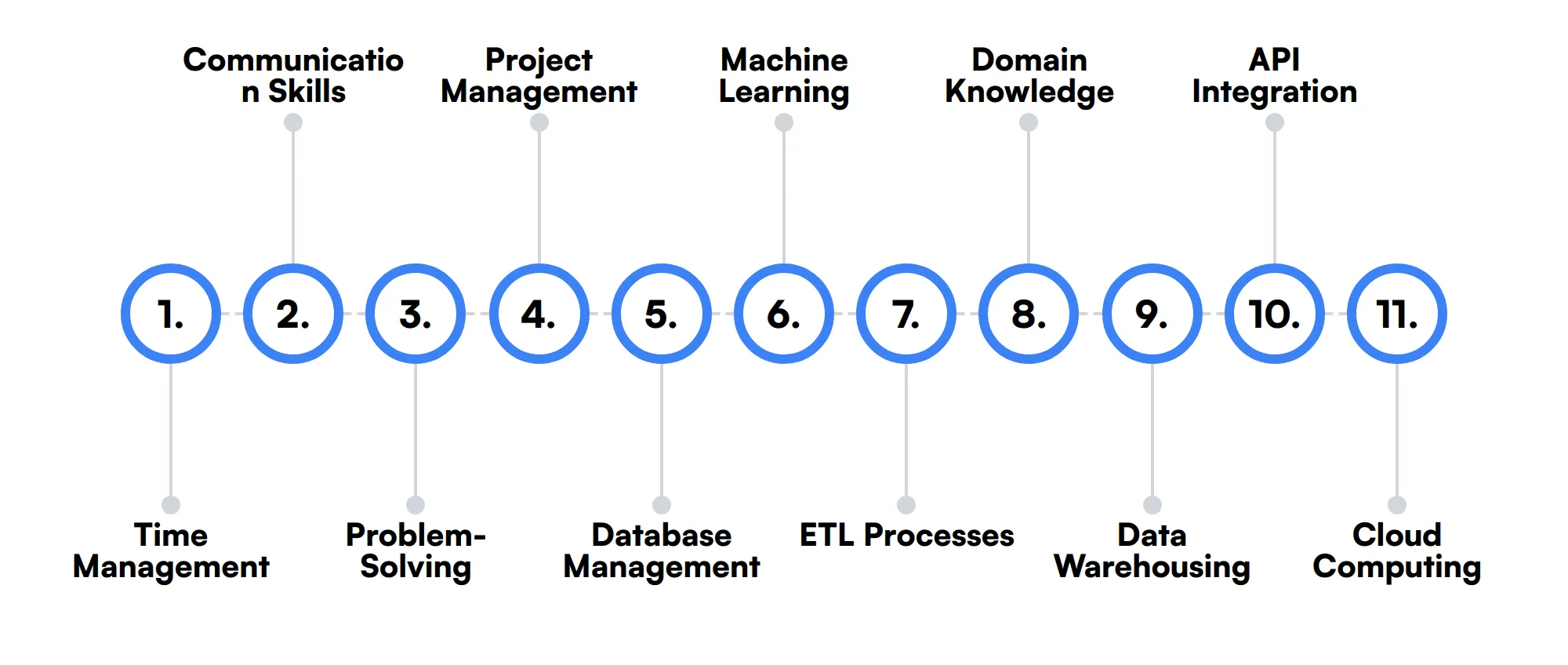
Time Management
Effective time management helps analysts prioritize tasks and meet deadlines. This skill is important for handling multiple projects and delivering timely insights.
Communication Skills
Strong communication skills enable analysts to convey their findings clearly to non-technical stakeholders. This includes writing reports and presenting data in an understandable manner.
Problem-Solving
Problem-solving skills help analysts tackle complex issues and find innovative solutions. This involves thinking creatively and applying analytical methods to overcome challenges.
Project Management
Project management skills are useful for planning and executing analysis projects. Analysts use these skills to coordinate tasks, manage resources, and ensure project success.
Database Management
Knowledge of database management helps analysts maintain and organize data efficiently. This includes understanding database structures and ensuring data integrity.
Machine Learning
Familiarity with machine learning techniques allows analysts to build predictive models and uncover deeper insights. This skill is increasingly important in data-driven industries.
ETL Processes
Understanding ETL (Extract, Transform, Load) processes is important for data preparation. Analysts use ETL tools to clean and transform data before analysis.
Domain Knowledge
Having domain knowledge helps analysts understand the specific context of the industry they are working in. This makes their analysis more relevant and impactful.
Data Warehousing
Knowledge of data warehousing is useful for managing large volumes of data. Analysts use data warehouses to store and retrieve data efficiently for analysis.
API Integration
Understanding API integration allows analysts to connect different data sources. This skill is useful for automating data collection and ensuring seamless data flow.
Cloud Computing
Familiarity with cloud computing platforms like AWS or Azure helps analysts leverage scalable resources for data storage and processing. This is particularly useful for handling big data.
How to assess Analyst skills and traits
Assessing the skills and traits of an analyst is a nuanced process that involves more than just glancing at a resume. Analysts play a critical role in interpreting complex data and turning it into actionable insights, which is why it's important to evaluate their proficiency across a range of technical and cognitive skills.
To truly understand an analyst's capability, one must consider their expertise in areas such as Data Analysis, Statistical Knowledge, SQL Proficiency, and Excel Mastery, along with their Critical Thinking, Programming Skills, Data Visualization, Business Acumen, and Attention to Detail.
Traditional hiring methods often fall short in accurately gauging these diverse skills. This is where Adaface assessments come into play, offering a tailored approach to evaluate candidates effectively. By incorporating real-world scenarios and practical tasks, these assessments provide a clear picture of a candidate's abilities and fit for the role. Learn more about Adaface assessments here.
Using Adaface, companies have reported a significant reduction in screening time, with some experiencing up to an 85% decrease. This streamlined approach not only speeds up the hiring process but also enhances the quality of hires, ensuring that the most capable analysts join your team.
Let’s look at how to assess Analyst skills with these 6 talent assessments.
Data Analysis Test
Our Data Analysis Test assesses a candidate's ability to handle, modify, analyze, and interpret data, crucial for roles in data analytics.
The test evaluates skills in data modeling, SQL queries, and data interpretation using charts and graphs, reflecting real-world business analysis scenarios.
Candidates who perform well demonstrate proficiency in extracting insights from data, predicting outcomes, and identifying data anomalies.

Statistics Test
The Statistics Test evaluates a candidate's understanding of statistical concepts and their application in data analysis.
This assessment covers a range of topics including statistical fundamentals, regression analysis, probability, and exploratory data analysis.
High-scoring individuals will show a strong ability to apply statistical methods to real-world problems, ensuring accurate data interpretation and decision-making.
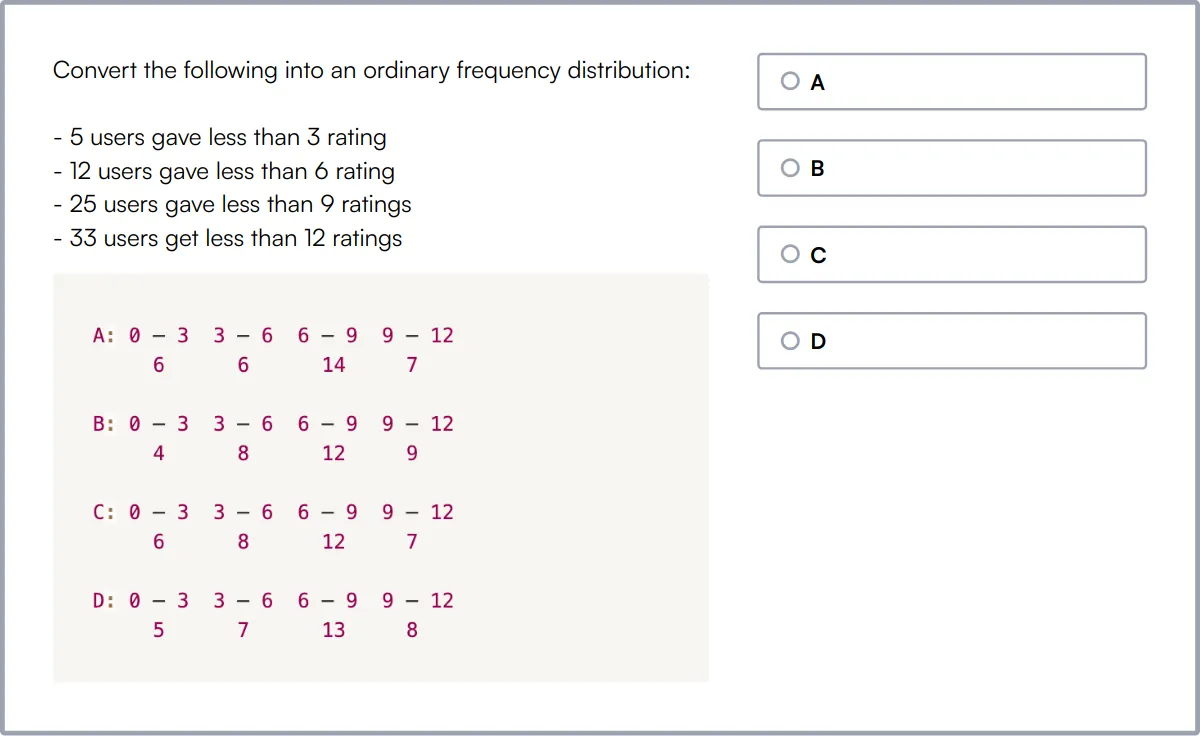
SQL Online Test
Our SQL Online Test is designed to evaluate a candidate's skills in designing and managing databases using SQL.
The test challenges candidates with tasks on creating and manipulating tables, writing efficient queries, and implementing security measures in database management.
Successful candidates will demonstrate a thorough understanding of SQL operations, optimizing database performance, and ensuring data integrity.

Excel Test
The Excel Test assesses a candidate's proficiency in navigating and utilizing Microsoft Excel for data analysis and reporting.
Candidates are tested on their ability to use advanced formulas, create PivotTables, and generate visual data representations like charts and dashboards.
Those who excel in the test are adept at handling large datasets, automating tasks with macros, and enhancing data-driven decision-making processes.
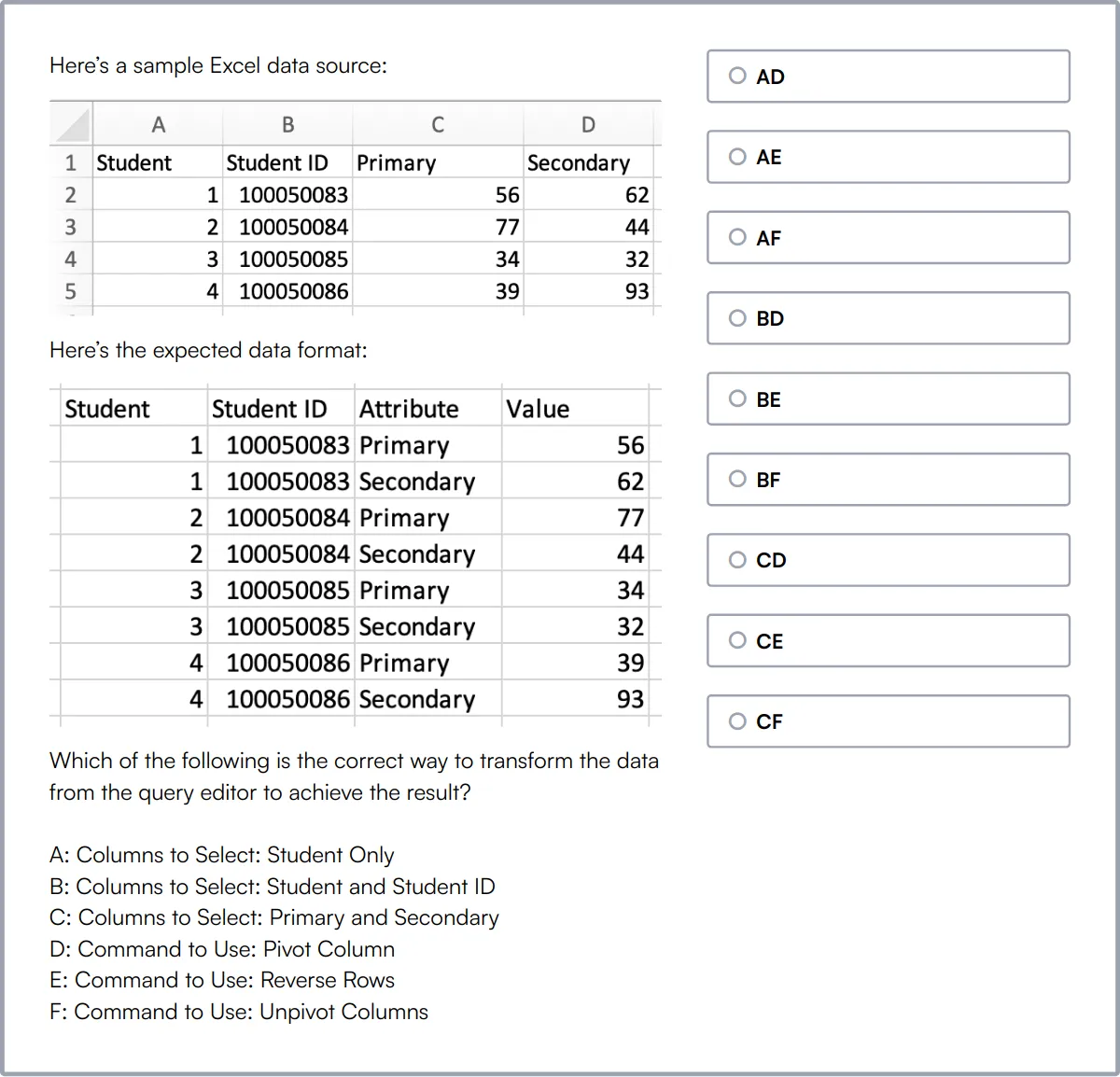
Critical Thinking Test
Our Critical Thinking Test measures a candidate's ability to analyze information, recognize assumptions, and make reasoned decisions.
The assessment focuses on logical reasoning, problem-solving, and the ability to evaluate arguments and predict outcomes.
Candidates who score well are likely to excel in roles requiring strategic decision-making and complex problem-solving.
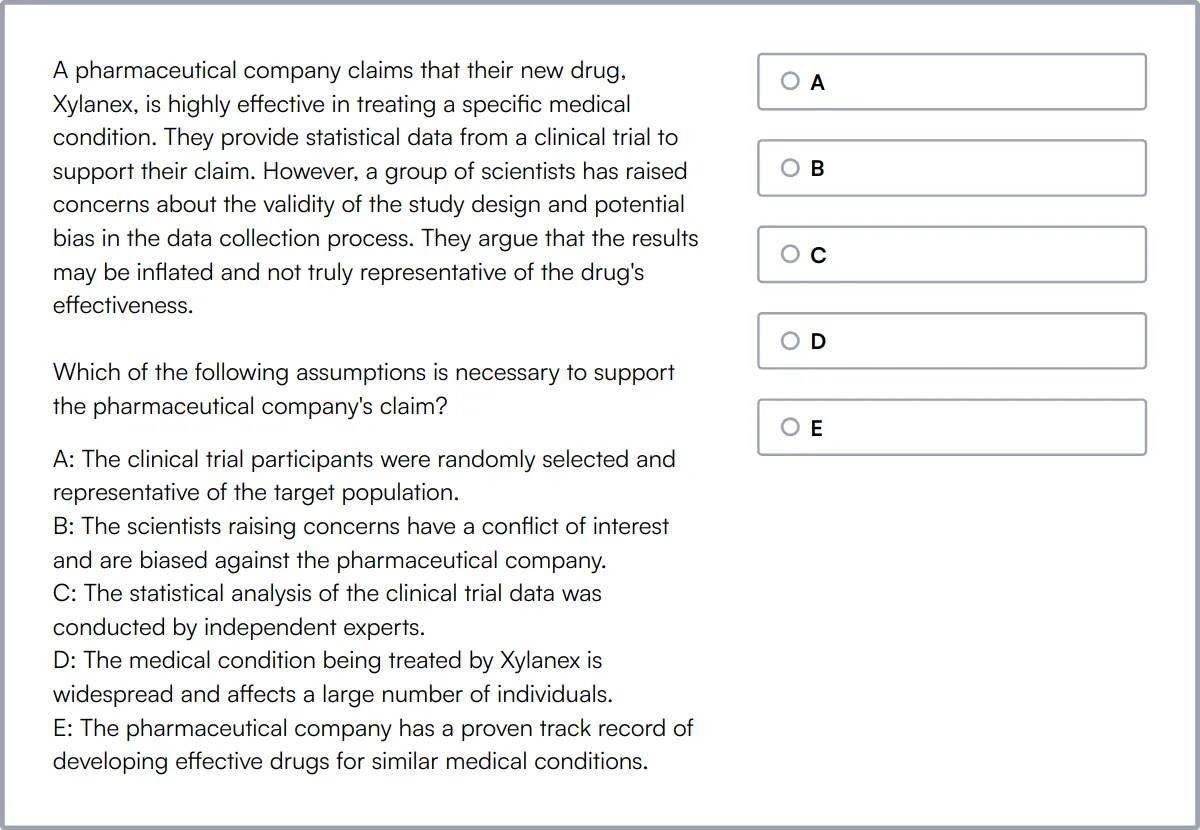
Python Online Test
The Python Online Test gauges a candidate's proficiency in Python programming, particularly for data structures and software development.
It includes questions on Python fundamentals, object-oriented programming, and handling databases, reflecting typical coding challenges encountered in the field.
A high score indicates strong coding skills, effective problem-solving abilities, and the capacity to manage complex software development tasks.
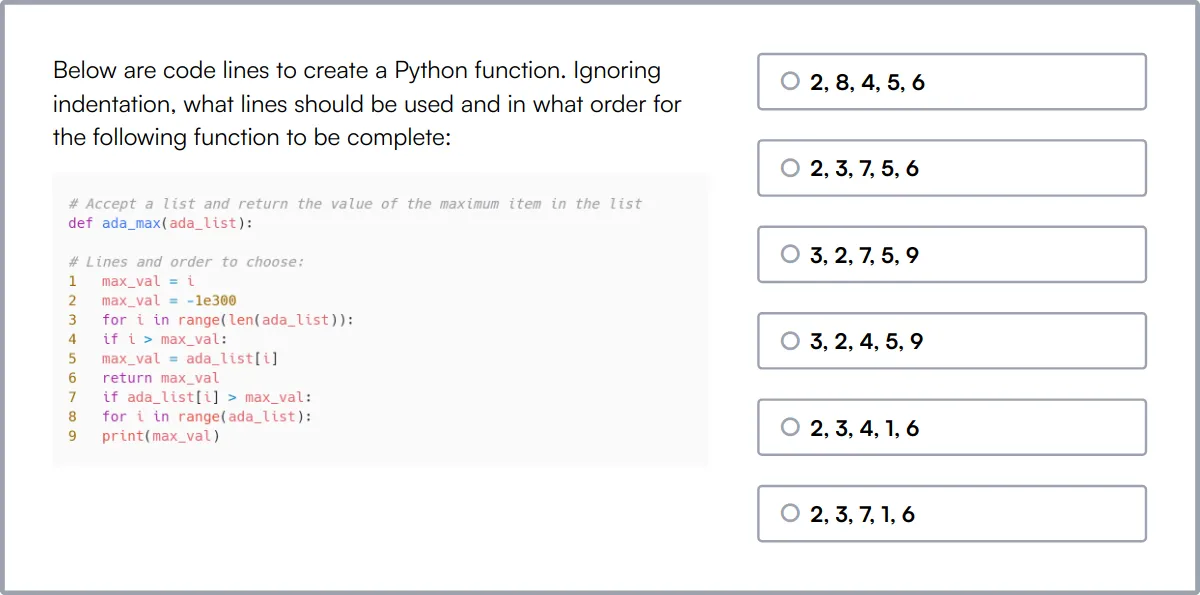
Summary: The 9 key Analyst skills and how to test for them
| Analyst skill | How to assess them |
|---|---|
| 1. Data Analysis | Evaluate ability to interpret and derive insights from data sets. |
| 2. Statistical Knowledge | Assess understanding of statistical methods and their application. |
| 3. SQL Proficiency | Test skills in querying and managing relational databases. |
| 4. Excel Mastery | Check proficiency in using Excel for data manipulation and analysis. |
| 5. Critical Thinking | Gauge ability to analyze situations and make logical decisions. |
| 6. Programming Skills | Evaluate coding proficiency in relevant programming languages. |
| 7. Data Visualization | Assess capability to create clear and informative visual data representations. |
| 8. Business Acumen | Determine understanding of business operations and strategy. |
| 9. Attention to Detail | Check for accuracy and thoroughness in data handling. |
Financial Analyst Online Aptitude Test
Analyst skills FAQs
What are the key skills to assess when hiring for an analyst role?
When hiring for an analyst role, focus on assessing skills in data analysis, statistical knowledge, SQL proficiency, and Excel mastery. Additionally, evaluate candidates on their critical thinking, programming skills, data visualization, and business acumen.
How can recruiters test SQL proficiency in candidates?
Recruiters can test SQL proficiency by giving candidates a practical test that includes writing SQL queries to solve real-world problems, extract data, and manipulate databases. This can be done during the interview or as a take-home assignment.
What is the importance of communication skills in an analyst role?
Communication skills are important for analysts as they need to explain complex data insights in a clear and understandable way to stakeholders and team members who may not have a technical background.
How can machine learning knowledge benefit an analyst?
Knowledge of machine learning can enable analysts to create predictive models and algorithms that improve decision-making and operational efficiencies. This skill is particularly valuable in industries like finance, healthcare, and e-commerce.
What tools can be used to assess time management skills in potential hires?
To assess time management, recruiters can ask candidates about their experience with project deadlines, prioritize tasks, and handle multiple projects. Behavioral interview questions or situational judgment tests can also provide insights.
Why is domain knowledge important for analysts?
Domain knowledge allows analysts to understand the specific challenges and nuances of the industry they are working in. This understanding helps them to provide more relevant insights and recommendations.
How can recruiters evaluate a candidate's data visualization skills?
Recruiters can evaluate data visualization skills by reviewing a candidate's portfolio of past projects or by asking them to create a visual representation of sample data during the interview process.
What role does project management play in an analyst's job?
Project management skills help analysts to oversee projects from conception to completion, ensuring that data-driven projects meet deadlines and objectives efficiently. This involves planning, executing, and monitoring project progress.
Assess and hire the best Analysts with Adaface
Assessing and finding the best Analyst is quick and easy when you use talent assessments. You can check out our product tour, sign up for our free plan to see talent assessments in action or view the demo here:

40 min skill tests.
No trick questions.
Accurate shortlisting.
We make it easy for you to find the best candidates in your pipeline with a 40 min skills test.
Try for freeRelated posts
Free resources



